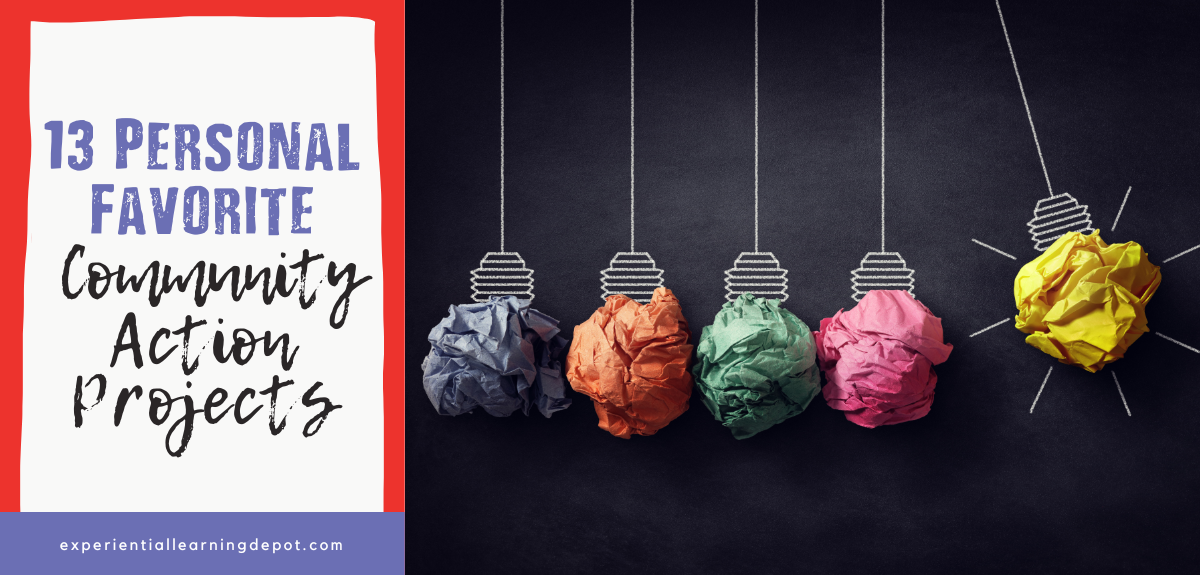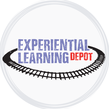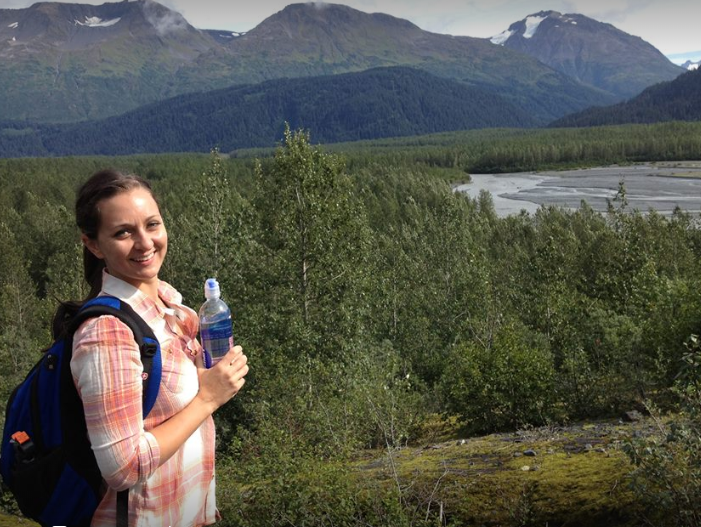|
Experiential learning resources for the innovative educator
Community action projects are student and personal learning experience favorites all times of year, but spring time is an especially great time for them for a variety of reasons. Spring is here, the weather is warming, and students are getting antsy. The school year is wrapping up for many. Teachers want to end the year on a high note, but are also exhausted and don't know how much more they have left to give! It's testing season, graduation season, grade report season. Ah! Spring is bonkers in the world of education. So what better way to cruise through the rest of the year than with a community action project (CAP)? Community action projects are self-directed project-based service-learning experiences. In summary, students choose a local or global issue of interest and/or personal relevance, design an action plan, and take action. Community action projects are interesting, multidisciplinary, and student-directed, which means there is little to no preparation involved on your part. You guide and facilitate. If you're not sure how to facilitate these experiences, go back to last week's post - How to Facilitate Community Action Projects in Four Easy Steps. AND, check out my portfolio of CAP resources to save yourself an enormous amount of planning time in this crazy season. Before getting into this post, I want to offer you some free experiential learning activity tools, including a free community action projects implementation spreadsheet. This spreadsheet is designed to help you manage projects in your classroom or homeschool, checking off completion of community action project-specific checkpoints along the way. 14 Project-Based Service-Learning Ideas To Wrap Up the School YearThe following is a list of some options for community action projects that are perfect for the end of the school year (or any time, really). The ideas listed here could be applied to most issues or project topics. Students can refer to this list when designing their action plans or you could choose an idea from the list to assign to the class. 1. Awareness Campaign: Students design a campaign that would educate the public on the issue of interest. They could create posters, t-shirts, a video promotion, etc. They can get super creative with this one, and the options are endless, especially with social media and other technologies available to quickly share the message with large volumes of relevant people. 2. Design and Make a Product: The idea behind this community action project is that students design and make something that raises awareness and provides a tangible outcome. The product should be usable or sellable to raise money for the chosen cause. An example is taking an invasive species, such as buckthorn here in MN, and using it as material for a product to then sell such as a bracelet or wastebasket. This action plan mitigates the buckthorn problem and raises money (selling the product at a school function, in boutiques, or on Etsy) to use toward a permanent, long-term solution (ex: donating the funds to a local conservation organization). This is a great option for the makers of the world! 3. Innovative Strategy to Raise Awareness: Imagine a student is interested in the issue of teen pregnancy. One way to raise awareness would be to create a brochure with some info and stats on the issue and pass it around town. Okay. That is technically raising awareness, but it's not a head-turner. One of my students did her community action project on teen pregnancy, a topic of her choice. She created a website with information about teen pregnancy, assembled HUNDREDS of fortune-tellers (paper origami game), and added a link to her website with instructions on how to enter a drawing. The purpose was to share information in an interesting and meaningful way, and she did just that. 4. Organize a School Club or Community Organization: I have had several students start and organize clubs for their community action projects. One group started an environmental science club. They created objectives and goals and organized club events related to their community action projects. The group of students put together a community-wide clean-up day where they walked the school neighborhood picking up trash. The club organizers invited speakers to come in and educate students on local environmental issues. This is a great option for students as they head into the summer break. Summer is a great time to get involved in the community, and if they are older students, build their resumes. I have a PBL bundle of resume builders, so check that out! 5. Community Volunteer: One way to take action on an issue of importance is by giving time to a cause. That often takes the shape of volunteering. Students find an organization relevant to the issue they've chosen for their project and give their time to that organization. One of my students did her project on human trafficking. She connected with a shelter that took in trafficking survivors to help them get back on their feet. She organized a food and clothing drive for women in the shelter. She coordinated and executed a speaker event where some of the women from the shelter came to speak to the community. This student not only gave her time to the cause that she was passionate about, but she was able to raise awareness about the issue at the same time. On top of that, she discovered her true passion in life and built essential 21st-century skills such as organization, collaboration, communication, planning, and more. If your students are juniors and seniors, consider getting them started with community action projects relevant to their career interests. Check out my senior community action project and career exploration and portfolio bundle. Combining these resources makes for a powerful exit for seniors. 6. Host a Fundraiser: Raising money is a great way to take action. The outcome makes a direct and tangible impact. Several of my students organized a holiday pie fundraiser at the time when the Syrian refugee crisis was front and center. They not only learned about the Syrian conflict but also how to organize an effective fundraiser. Students had to learn which organizations were reputable and would get the money into the right hands. They learned how to make homemade pies and how to market their fundraiser. They had to figure out how to make a profit, not lose money, and more! This experience resulted in the development of content knowledge in addition to 21st-century skills such as collaboration, global awareness, financial literacy, and more. 7. Write Letters and Meet with Legislators: Advocating for legislation is a really powerful learning experience, not only because students make an impact on their communities at the time, but they also develop the skills to continue to do so long after they've graduated. It's important for students to know their rights and how to advocate for themselves and their communities over the course of their lives. I had a student that was frustrated with the lack of job prospects for ex-convicts. She wrote letters to her local legislators expressing her interest in the issue and invited them to come to the school to meet with her and talk about possible solutions. One of her legislators came to the school to meet with her where they brainstormed solutions at the legislative level. 8. Artistic Production: This is another way to raise awareness about a local issue. This idea here is that students develop some kind of production such as a skit, play, documentary, music concert, etc. that raises awareness in an interesting and emotionally triggering way. They then bring the production to relevant audiences around the community or host an event. For example, a group of students doing a project on the issue of bike accidents might create a skit that demonstrates bike safety and perform that skit at local elementary schools or community clubs in the area. I like to have my students tackle social justice issues through artistic expression as well. Students raise awareness and move the change needle using art as the agent of that change. For example, they might create a mural or public art installation to provoke conversations about a specific social justice issue that is personally meaningful to the students. 9. Philanthropic Businesses: I like to have my students start their own businesses, and sometimes I give a standard business a little twist, one of which is asking students to develop businesses that have a philanthropic angle. TOMS shoes is an example of a business that gives back. For every pair of shoes that they sell, they donate a pair to a person in need. This type of learning experience, developing a business in general, is a great one to do at the end of the year. Take the time in the spring to have students develop businesses so that they can launch and run them over the summer. 10. Demonstrations: This is when students organize a walk or demonstration to raise awareness about an issue personally important to each student. Our students have participated in the Science March, March for Immigration, and Women's March. They create original signage for the events. They document the experience by creating a documentary, a photo journal, a vlog, or a blog about the experience. I have also had students organize their own walks. Some of my students read a book for their book club called "Am I Blue?", which inspired them to organize a walk. They recruited participants from the school and the community. I want to clarify before moving on that community action projects are self-directed, meaning students choose to examine issues of personal importance or meaning and design their own projects. In other words, I do not tell any student what to do nor how to feel about any community issue. That's important always, but I think it is especially important when the experience, such as a demonstration, requires students to take a stance on an issue. Students spend a significant amount of time gathering credible information and analyzing a variety of perspectives so as to take a stance or form an opinion that is all their own. The idea is to get students looking at issues from different angles and help them develop the skills to effectively act on the things that matter to them personally or those community issues that impact their lives. 11. Host a School Event: This is a fun one but takes some effort on your part. I have had students organize screenings of documentaries that are only available to educators. One specific example is the documentary "Sold", which is a movie version of the book "Sold", which I read with students for a women's studies seminar. I have also had students host environmental science fairs, fundraisers (carnivals, cook-offs, car washes, etc.), heritage fairs, speaker series, and more. 12. Senior Action Project: Community action projects are great for wrapping up not just the school year but entire high school careers. My students do a senior year focused community action projects, designing and leading community action projects based on their postsecondary path or career of interest. Each student identifies a community issue that is related to a personal career of interest. They then examine that issue, brainstorm solutions, develop a plan of action, and take action. This is an amazing way for exiting seniors to further bolster their resumes and prepare for what is to come. I implement senior-year community action projects as part of a bigger and more robust senior experience. Click on the link to learn more. 13. Seasonal/Timely-Themed Community Action Projects: I originally wrote this post to offer end-of-the-school-year-specific community action projects. It has slightly evolved over the years to be more inclusive of all times of year, Many educators and homeschools learn year-round or simply have different schedules than I do. With that said, there are specific events that happen this time of year regardless of what hemisphere you're in or your learning schedule. I like to get my teens excited for community action projects by posing a relevant theme for them to work around. For example, May is Mental Health Awareness Month in the U.S. Mental health is top of mind right now because are currently in the month that has been dedicated to it. I also like this theme because each and every one of my students can directly or indirectly relate to mental health in some way. It impacts their lives every single day in some way or another. So, I often assign student-led community action projects this time of year around mental health. Students choose a subcategory, research the issue, and design and execute of a course of action. Other great themes for community action projects this time of year include LGBTQ (awareness month is coming up in June), environmental issues (World Environment Day is on the horizon), or any other relevant or trending topic/issue/theme. If you're interested in community action projects but aren't sure where to start or how to implement them, check out my guided/themed community action projects and my community action project tool kit. Take a peak at this video for more details! Community action projects are really powerful, inspiring, and a great way to end the year, especially if you host an exhibition or presentation night to show off their final products. There are many more options for action plans than those that I listed here. I highly recommend checking out my Facebook group - Experiential Learning for K-12 Teachers - to get more ideas from educators who have been there. I am consistently blown away by the experiential learning community. There are so many amazing ideas out there from such inspirational group of people! I would love to hear of student projects and outcomes. Feel free to send me photos or comments to [email protected]. I'd love to feature them on the blog! Online Courses: Let's be friends! Follow Experiential Learning Depot on Pinterest, Facebook, Youtube, and Instagram for more on experiential education, and check out my TpT store for experiential learning resources. Relevant Blog Posts:Observe. Question. Explore. Share.
3 Comments
8/29/2022 10:06:56 pm
It made sense when you mentioned that school clubs can help raise awareness. My friend wants her career to be her lifetime profession. I should advise her to take the ICAP program so she can choose the best career for her.
Reply
HappyButtercup36
2/3/2023 09:23:35 am
Helpful, but bigger than many are ready for
Reply
Sara from Experiential Learning Depot
2/3/2023 09:40:09 am
It is a big undertaking depending on the nature of the experience, yes. My upper level students (11th and 12th) are ready and handle it well with guidance and implementation systems in place. I typically organize whole group community action projects for those younger than that. Thanks for the comment!
Reply
Your comment will be posted after it is approved.
Leave a Reply. |
Blog IntentTo provide innovative educational resources for educators, parents, and students, that go beyond lecture and worksheets. AuthorSara Segar, experiential life-science educator and advisor, curriculum writer, and mother of two. Categories
All
|



















 RSS Feed
RSS Feed